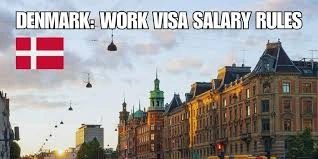Learn about Denmark’s updated salary thresholds for work and residency permits, effective January 2025. Understand the requirements for foreign workers and how salary is assessed.
Denmark Sets New Salary Thresholds for Work and Residency Permits Starting January 2025
Denmark has announced updates to its salary and employment terms for residency and work permits, effective from January 2025. These changes are important for foreign nationals seeking to live and work in Denmark. The new salary thresholds and employment terms must align with Danish standards, and applicants must meet these criteria to qualify for residency and work permits.
What Are the New Salary Thresholds for Denmark’s Work Permits?
From January 1, 2025, all applications for residency and work permits in Denmark will be assessed based on the updated income statistics, which reflect data from the third quarter of 2024. This means that foreign workers applying after December 31, 2024, will need to meet the revised salary requirements. The income statistics are updated quarterly, and the next update will occur on April 1, 2025.
These updated salary thresholds will apply to various schemes, including the Pay Limit Scheme, Supplementary Pay Limit Scheme, Fast Track Scheme, and the Positive List for Skilled Workers and those with higher education qualifications.
Salary Assessment Criteria for Denmark’s Work Permits
To qualify for a residence and work permit in Denmark, applicants must meet salary requirements that correspond to Danish employment standards. This means the salary must be fixed, guaranteed, and paid out regularly, and the payment must be made to a Danish bank account.
Only liquid funds—such as the fixed salary, contributions to pension schemes, and holiday allowance—are included in the salary assessment. Additional staff benefits like board and lodging cannot be counted as part of the salary in the assessment.
Foreign workers must also ensure that their salary is paid in Danish kroner (DKK). For applications submitted after September 1, 2024, the salary must be reported in DKK. Commissions or bonuses that are uncertain or vary greatly are generally excluded from the salary calculation.
What Happens if the Employer Is Not Covered by a Collective Agreement?
If an applicant’s employment is not covered by a collective agreement, and their employer is not part of an employer’s organization, the Danish Agency for International Recruitment and Integration (SIRI) will assess whether the salary aligns with Danish standards. In some cases, SIRI may contact the Regional Labour Market Councils (RARs) for additional information and may request comments from the employer before making a decision.
Salary Assessment Process for Work and Residency Permits
SIRI relies on the salary statistics compiled by the Confederation of Danish Employers (DA) to determine if an applicant’s offered salary meets Danish standards. For most applications submitted after January 1, 2021, salaries must be deposited into a Danish bank account to qualify. This ensures a clear and transparent salary payment process.
If an employment contract is covered by a collective agreement, the salary is presumed to meet Danish standards. However, SIRI will review applications where the employer is not part of an employer’s organization and is not covered by a collective agreement.
Key Takeaways for Applicants
- New salary thresholds will be based on third-quarter 2024 income statistics for all applications submitted from January 2025.
- Salaries must meet Danish standards, including guaranteed and fixed pay, pension contributions, and holiday allowance.
- Benefits such as board and lodging cannot be included in the salary assessment.
- Salaries must be paid in Danish kroner (DKK), and commissions or bonuses are excluded.
- Employers must follow Danish employment rules for salary, including paying to a Danish bank account.
These updates to Denmark’s work and residency permit salary thresholds highlight the country’s focus on ensuring that foreign workers meet its employment standards. Foreign nationals planning to apply for work permits in Denmark starting January 2025 should familiarize themselves with the updated requirements to avoid delays in the application process.



